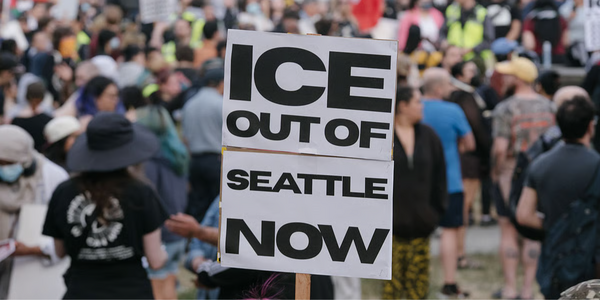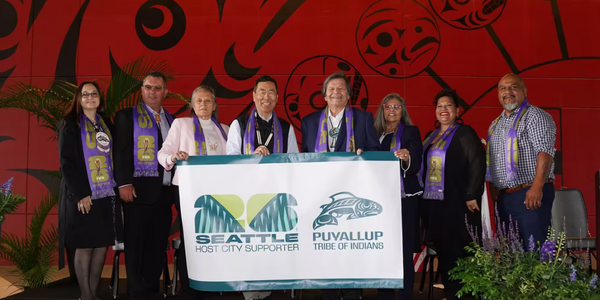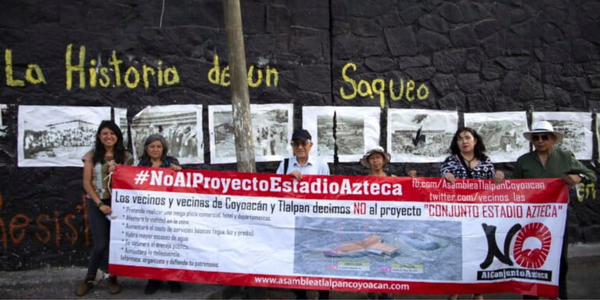Countdown to the FIFA Men's World Cup 2026
**TW: This article contains references to sexual violence which some readers may find distressing**
From June 11 to July 19, 2026, the Men's World Cup will take place in the United States, Mexico, and Canada. With 48 participating nations, it will be the largest World Cup in history. What at first glance looks like a tournament in democratic countries, on closer inspection becomes a magnifying glass for human rights abuses: racist police violence, attacks on indigenous communities, femicides, anti-trans laws, and restrictions on freedom of the press and freedom of expression are a bitter reality in the host countries.
Human rights organizations such as Human Rights Watch, the Sport & Rights Alliance, and Amnesty International have identified critical areas in which the policies of the host countries for 2026, especially those of the United States under President Donald Trump, pose significant and immediate risks to the human rights of migrants, freedom of the press and expression, the rights of the LGBTQI community, and the right to non-discrimination, and have called for urgent and transparent action.
“In 2018, the US, Mexico, and Canada made clear human rights commitments in their bid documents to host the 2026 FIFA World Cup,” said Andrea Florence, Executive Director of the Sport & Rights Alliance. “Despite FIFA's motto that ‘football connects the world,’ there is a risk that a World Cup held under discriminatory and exclusionary conditions will deepen social divides rather than bridge them. FIFA should use its influence to demand concrete, legally binding guarantees that human rights will not continue to be sacrificed for the sake of sport.”
https://www.fairplay.or.at/en/archive/der-countdown-zur-fifa-wm-2026#top
Discriminatory immigration policy
FIFA expects up to 6.5 million people to attend the tournament in the host countries. The abusive immigration policies of the current US administration, including forced deportations under the Alien Enemies Act, entry bans, increased detentions, and visa restrictions, jeopardize the inclusivity and global character of the World Cup.
On June 4, 2025, the Trump administration issued an executive order banning visitors from twelve countries and imposing strict entry restrictions on seven others. Although the order provides exceptions for qualified teams, fans, family members, and journalists from these countries are currently unable to enter the US. Furthermore, any entry ban based solely on nationality contradicts the values of inclusion and global participation to which the World Cup and FIFA are committed.
The 2026 World Cup will depend on the workers in the stadiums, hotels, fan zones, and restaurants. It also depends on players, fans, families, and citizens feeling safe in the host cities. However, raids by the Immigration and Customs Enforcement (ICE) agency have resulted in many people being afraid to go to work or school, let alone work at or attend a sporting event.
"FIFA should publicly acknowledge that US immigration policy and other human rights violations threaten the integrity of the tournament and use its influence with the US government to ensure that the rights of all qualified teams, coaches, media representatives, and fans are respected when entering the United States, regardless of their nationality, gender identity, religion, or opinion," said Minky Worden, director of global initiatives at Human Rights Watch.
“We are particularly concerned about the possibility of selective enforcement and discrimination against fans based on their perceived political views or national origin,” said Ronan Evain, executive director of Football Supporters Europe. The FARE network is also concerned that immigration authorities (ICE and others) will have an increased presence in and around stadiums.
https://www.fairplay.or.at/en/archive/der-countdown-zur-fifa-wm-2026#top
Freedom of expression and freedom of the press
Another worrying development in the United States is the current situation regarding freedom of expression, freedom of the press, and freedom of assembly.
Following Los Angeles and Washington DC, the Trump administration has repeatedly announced plans to send the US National Guard to Chicago and Portland after protests against ICE broke out in these (mostly Democrat-governed) cities. Trump is currently even threatening to withdraw the right to host World Cup matches from some cities.
Journalists covering the 2026 World Cup face particular and alarming risks in both Mexico and the United States. Mexico is one of the most dangerous and deadly countries in the world for media professionals, who are threatened, harassed, and attacked by both organized crime and public officials. Widespread impunity for these crimes has a chilling effect and leads to a culture of silence in which critical information is suppressed. In the United States, journalists may face intrusive checks, social media surveillance, and entry denials based on their perceived political views, which will impair their ability to report independently.
https://www.fairplay.or.at/en/archive/der-countdown-zur-fifa-wm-2026#top
Discrimination and violence against LGBTQI people
The increasing legal and rhetorical attacks on the rights of LGBTQI people, especially transgender people in the US, underscore the current US administration's intention to banish transgender people from public life and dismantle important human rights guarantees as quickly as possible. Trump's views on what he calls “gender ideology” are based on a denial of the right to self-determination.
At the 2026 FIFA World Cup, trans people, including athletes, could be stigmatized by visa requirements that require them to disclose their sex assigned at birth. Discriminatory laws and the hostile political climate toward LGBTQI rights in the United States could directly threaten the safety, physical integrity, dignity, and inclusion of LGBTQI fans, players, staff, or journalists.
LGBTQI people worldwide face increasing threats to their rights as governments enact restrictive laws, policymakers amplify hostile rhetoric, and incidents of violence occur far too frequently. Trans people remain a particularly vulnerable group, especially in Mexico, one of the most dangerous countries in Latin America for trans people. In 2022, more than 95% of murders in Mexico went unpunished. The number is likely to be significantly higher for trans femicides.
In March 2025, Human Rights Watch published a map that also shows some progress. Twenty-two of Mexico's 32 states have now passed laws to guarantee the legal recognition of transgender people's gender identity. Marriage equality is now recognized in all 32 states—a milestone achieved through years of lobbying and litigation.
https://www.fairplay.or.at/en/archive/der-countdown-zur-fifa-wm-2026#top
Women's rights
In the United States, we are currently experiencing setbacks in women's rights under the Trump administration. For example, there are large parts of the country where women* and girls* currently have no access to abortion.
Furthermore, the administration's attacks on diversity, equity, and inclusion [DEI] for women* in the workplace will be particularly dangerous for Black, Latinx, and Indigenous women*. The administration is also attempting to extend its ideological crusade against DEI to the United Nations and its organizations, demanding that they follow the Trump administration's example.
In Mexico, there are currently two sides when it comes to women's rights: on the one hand, there is the image of a new president, Claudia Sheinbaum, who promised during her election campaign to improve conditions for women*.
Mexico has made some significant progress on women's rights issues, such as legalizing abortion in 12 states and increasing women's participation in government.
However, violence against women* has worsened. Statistics from the Mexican government show that almost 50% of women* and girls* aged 15 and older have experienced sexual violence, an increase of almost 10% in 10 years. The actual extent is likely to be much higher, as the vast majority of crimes are not reported. Femicide has become a major problem in Mexico. In 2015, femicides accounted for 19.8% of murders of women*, but by 2024, that figure had risen to 24.2%.
In his first major act as Canadian Prime Minister, Mark Carney abolished the extremely important Department for Women and Gender Equality (WAGE) – a decision he reversed after the parliamentary elections in the face of protests. However, WAGE Canada's budget is set to be cut by a whopping 80% by 2028. Implementing the planned cuts would be a serious blow to millions of women* – and a dangerous signal given the increasing attacks on reproductive rights and the rights of 2SLGBTQ+ people (“2S” is an acronym for “Two Spirit,” a term used by many Indigenous people to describe a person who embodies both a female and male spirit in one body).
https://www.fairplay.or.at/en/archive/der-countdown-zur-fifa-wm-2026#top
Indigenous rights
It remains to be seen what positive developments will result from the cooperation between civil society groups or initiatives and FIFA. The 2026 World Cup, for example, is the first tournament in which an indigenous group has entered into an agreement with a host city: the Puyallup people are joining SeattleFWC26 as an official legacy supporter for all activities and campaigns. The idea behind this is to give indigenous communities the opportunity to tell their own stories on a global stage.
https://www.fairplay.or.at/en/archive/der-countdown-zur-fifa-wm-2026#top
Approximately 6.6 million people who identify as indigenous live in the United States, representing about 2% of the total population.
Although the income of the indigenous population has risen dramatically in recent decades, there is still a high unemployment rate. In addition, about a quarter live in poverty, which is the highest rate of any population group in the country. Despite many improvements, the life expectancy of indigenous groups is still the lowest in the US. One of the many reasons for this is that indigenous reservations are used as dumping grounds for toxic or nuclear waste, which in turn leads to water pollution and many other environmental and health problems.
Another major problem in the US is police violence against indigenous communities. Although this has received little media attention, indigenous activists have used the hashtag #NativeLivesMatter to mobilize support and draw attention to the disproportionate level of police violence against indigenous people.
Since taking office, President Trump has ordered several measures that have raised significant concerns about their disproportionately negative impact on indigenous peoples or members of the 2SLGBTQ+ community in the US. For example, a series of executive orders favoring the fossil fuel industry have raised concerns about the protection of indigenous territories from resource extraction. The Trump administration's proposed freeze on federal grants would also result in cuts of $24.5 billion in funding for indigenous communities in the areas of health, law enforcement, and education, according to independent calculations.
Mexico is home to 68 indigenous peoples, representing nearly 17 million people and about 15% of the total population. This makes Mexico the country in the Americas with the largest indigenous population and the largest number of indigenous languages spoken on its territory.
One of the biggest challenges facing Mexico's indigenous population is lack of recognition. In many states, indigenous legal systems are not yet fully recognized. Although access to education is guaranteed in Mexico's constitution, young people living in indigenous communities are the most disadvantaged in this area. Shortly before taking office, Mexican President Claudia Sheinbaum stated that she considers constitutional reforms for social programs affecting the rights and recognition of the indigenous population to be one of her top priorities. For example, in a decree, Sheinbaum ordered the establishment of a presidential commission for justice plans and regional development for indigenous and Afro-Mexican peoples.
According to the 2021 Canadian census, there are approximately 1.8 million indigenous people living in Canada, representing 5.0% of the total population. Many indigenous peoples continue to suffer from the non-recognition of their rights and titles, the harmful effects of the extractive industry on these rights, and the slow implementation of the United Nations Declaration on the Rights of Indigenous Peoples (UNDRIP). At the same time, indigenous groups face long-standing social inequalities in areas such as health care, education, and the ongoing crisis of violence against indigenous women* and girls*.
The discovery of the bodies of 215 Indigenous children on the grounds of a former school (boarding school) in May 2021 once again drew the world's attention to Canada's colonial past and sparked new calls for reckoning and justice. Throughout most of the 20th century, at least 139 “boarding schools” with approximately 150,000 Indigenous children were operated by various churches with financial support from the federal government. These “schools,” scattered across the country, aimed to eradicate the culture and languages of the country's Indigenous population. As early as 2015, the Truth and Reconciliation Commission concluded that this amounted to “cultural genocide.”
https://www.fairplay.or.at/en/archive/der-countdown-zur-fifa-wm-2026#top
Climate change
Especially since Gianni Infantino was elected FIFA president in 2016, FIFA has been talking more and more about the climate crisis, while at the same time organizing mega-events that apparently exacerbate this crisis.
According to a recent study, the 2026 Men's FIFA World Cup will be the most climate-damaging edition in the history of the tournament – its greenhouse gas footprint is expected to be almost twice as high as the average of the previous four finals. Scientist Tim Walters even estimates that the World Cup could generate nearly 70 million tons of CO2 and lead to the premature death of about 70,000 people. The main reasons for this balance sheet, apart from the expansion of the tournament from 32 to 48 teams, are the long distances that are expected to be covered mostly by plane.
On his first day in office, Trump signed a series of executive orders announcing the United States' intention to withdraw from the Paris Agreement, repealing a number of his predecessor's renewable energy initiatives and declaring a national energy emergency.
With the 2026 World Cup jointly hosted, the implications of the political relationship between Trump and FIFA President Gianni Infantino on global sport are complex, far-reaching, and raise many questions. Are FIFA's values compatible with those of MAGA? How can a sports organization committed to raising awareness about the climate crisis ally itself with a nation that recently ordered all references to it to be removed from government websites?
Unfortunately, it currently appears that Canada is following a similar course to the US. Canadian Prime Minister Mark Carney, who was sworn in in March 2025, is in many ways a Canadian version of Trump. Like its southern neighbor, Canada is extracting more oil and gas than ever before, is currently the fifth-largest oil producer in the world, and produces some of the dirtiest and most energy-intensive oil on the market.
The climate aspect is closely linked to the rights of indigenous populations. In Mexico, for example, infrastructure projects related to the tournament (for accommodation, parking, road expansions, etc.) are being criticized because they negatively impact surrounding ecosystems, water resources, and wildlife protection. In Mexico City, the area around the Azteca Stadium is mainly inhabited by indigenous people. “As residents, we were neither consulted nor informed about environmental impact assessments,” said one activist. “According to the Mexico City constitution, such work requires the consent of the indigenous population, and we have not approved anything.” Activists and communities in the three World Cup host cities believe that the economic interests associated with the tournament do not take sufficient account of the protection of the environment and wildlife.
https://www.fairplay.or.at/en/archive/der-countdown-zur-fifa-wm-2026#top
FIFA's responsibility
When FIFA awarded the 2026 World Cup to the then “joint bid” by the US, Canada, and Mexico, it announced the tournament as an event that would “unite people and inspire positive change through soccer.” Following criticism of human rights violations at the 2018 World Cup in Russia and the 2022 World Cup in Qatar, FIFA promised to take more responsibility. The 2026 World Cup is also the first men's World Cup with a published human rights strategy, which is being touted as a new benchmark for sporting events worldwide.
At a meeting with President Donald Trump in the Oval Office in March 2025, FIFA President Gianni Infantino said, “America will welcome the world. Millions of people will come, Mr. President, millions of people!” And at a meeting of the White House Task Force on the 2026 World Cup on May 6, Vice President JD Vance announced: “Everyone is welcome to witness this incredible event.”
So far, FIFA has not criticized Trump's discriminatory immigration policy – or other human rights issues in the host countries. Infantino's silence not only poses a business risk, but also betrays FIFA's own human rights principles. FIFA's statutes and human rights policy state that it will use its influence to protect human rights “and contribute positively to their realization,” including through “constructive cooperation with the relevant authorities.”
With the countdown to the 2026 World Cup underway, FIFA must do more than simply claim that “the world is welcome in America” when all signs point to the contrary. Unless decisive action is taken, there is a risk that the legacy of the 2026 FIFA Men's World Cup will be irrevocably damaged and a dangerous precedent set for future major sporting events.
https://www.fairplay.or.at/en/archive/der-countdown-zur-fifa-wm-2026#top
The “GAME ON! Sport for Human Rights” campaign for the 2026 FIFA World Cup is being implemented by the fairplay Initiative in cooperation with national and international partners and is largely funded by the Austrian Development Agency (ADA).
https://www.fairplay.or.at/en/archive/der-countdown-zur-fifa-wm-2026#top
https://www.fairplay.or.at/en/archive/der-countdown-zur-fifa-wm-2026#top





